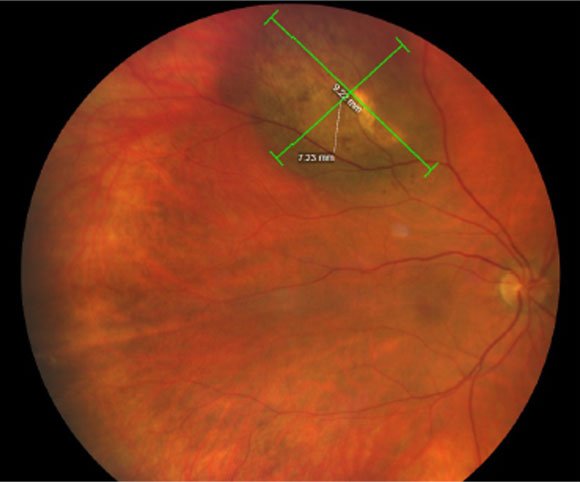 |
|
Study identifies several risk factors in overall and cancer-specific survival. Photo: Amy Bade, OD. Click image to enlarge. |
A team of researchers recently initiated a study to identify the prognostic factors for patients with uveal melanoma without metastases. They found a number of independent risk factors, including age, primary site, histological type, T-stage and treatment.
The study included 4,119 patients who were registered in the Surveillance, Epidemiology, and End Results (SEER) database. Through univariate and multivariate Cox regression analyses, the study authors identified independent risk factors affecting overall survival and cancer-specific survival. This information was then used to construct nomograms.
Data showed that age, primary site, histological type, T-stage and treatment were independent risk factors for overall survival and cancer-specific survival. The researchers also found that marital status and sequence number were only risk factors for overall survival.
The study authors reported that the C-indices for internal validation of overall survival and cancer-specific survival were 0.713 and 0.708, respectively. For external validation, they were 0.729 and 0.731, respectively.
“Advanced age, ciliary body involvement, epithelioid cell melanoma, more advanced T-stage and surgery-only treatment are independent risk factors for both a poor overall survival and a poor cancer-specific survival in patients with uveal melanoma without metastasis,” the study authors stated in their recent Journal of Ophthalmology paper. “Widowhood and multiple primary cancers are independent risk factors only for overall survival.”
The construction of nomograms in this research to predict the three- and five-year overall survival and cancer-specific survival rates could potentially provide a more accurate and individualized prediction method for patient survival, according to the study authors, who noted that in the future these nomograms may serve as a basis for the development of individualized treatment strategies.
Liu X, Liu C, Shang Y, et al. Prognostic factors and nomograms for overall and cancer-specific survival of patients with uveal melanoma without metastases: a SEER analysis of 4119 cases. J Ophthalmol. September 14, 2022. [Epub ahead of print]. |

